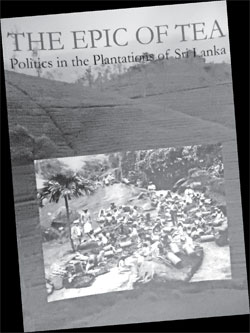|
The real story of tea:
Unsung pioneers of misty mountains
The Epic of Tea: Politics in the Plantations
of Sri Lanka
By A.P Kanapathypillai
Published by the Social Scientists Association
Reviewed By Aditha Dissanayake
Time after time many a writer has waxed eloquent about the misty
mountains wrapped in a green blanket of tea, in the tea district of Sri
Lanka; (“mild breezes, crisp air, bright coloured saris scattered among
the greenery, lend the gardens of Ceylon a pleasant mien...”).
 What this picture does not reveal however, is that till the mid
twentieth century, behind the picturesque women in mist-shrouded fields
were terrible working conditions, low wages, and coercive labor
practices enforced by a capitalist mode of production. What this picture does not reveal however, is that till the mid
twentieth century, behind the picturesque women in mist-shrouded fields
were terrible working conditions, low wages, and coercive labor
practices enforced by a capitalist mode of production.
It is satisfying to note that while many have extolled the courage
and stamina of the British planters of the 19th Century, (they were
compared by Sir Arthur Conan Doyle to the lion at Waterloo), in the Saga
of Tea, A.P Kanapathypillai reveals the story of the migrant workers
whose lives were a hundred times more difficult than those of their
employers and on whose shoulders the entire plantation industry
depended.
Through this immensely readable, ethnographic, and historical
narrative of the plantations of Sri Lanka, Kanapathypillai provides a
sophisticated examination of the anguish and ethos of the immigrants
from India, their semi-slave conditions during the British Raj and their
struggle for parity in recent times with the other communities of this
adopted land.
The journey of the workers from Tamil Nadu to the coffee plantations
in Dambulla, Matale and Kandy reminds one of a chapter in Alex Haley’s
novel, “Roots”. “The journey to Sri Lanka across the Palk Strait was
difficult and arduous. The workers, in groups, trekked through the arid
sun-scorched plains of South India When they reached the port to cross
the Palk Strait, they were tired, exhausted, starved and dehydrated. At
the port they took catamarans or other country craft to cross to Mannar.
The most popular route was the 210 mile trek from Mannar to
Medawachchyiya or Puttalam.”
Though initially the workers were recruited from India for the coffee
plantations, when an attack of blight, which the workers called Pooche
destroyed the coffee leaves, British entrepreneurs began to replace
coffee with tea plants. Yet, even though the tea industry proved even
more lucrative than the coffee industry, even as the British
entrepreneurs continued to invest in large scale tea plantations the
conditions of the workers who arrived in Sri Lanka from India remained
the same or worse.
Kanapathypillai reveals that “the relationship between planter and
worker was essentially feudal, and there were little or no link between
the two, other than through an intermediary, the kangany.” For many
years there was no awareness among workers about organizing themselves
through trade union activity to demand their just rights.
But as the years passed the kangany gradually lost his grip on the
workers. “The “tundu” system whereby a kangany could transfer his work
gang from one plantation to another, was abolished in 1921” writes
Kanapathypillai. “The migratory nature of the plantation workers
declined, and by 1920 most were permanently resident in Ceylon, thus
acquiring the characteristics of wage labour”.
An interesting paragraph in the chapter on the franchise rights of
the plantation workers records a quote from Agnes de Silva who was a
part of the delegation from the Women’s Franchise Union to the
Donoughmore Commission on Constitutional Reforms. “Lord Donoughmore
asked if I wanted Indian Tamil women laborers on the estates to have the
vote. I replied - certainly, they are women too”.
The book also records the significant strikes on the tea plantations
beginning with the strike on Kotiyagala Estate, Bogawanthalawa in 1939.
It is interesting to note that the workers had formed an association,
not with the intention of demanding higher wages or better living
conditions but for the prohibition of the sale of liquor and gambling on
their estate. When the white superintendent refused to permit this they
resorted to strike action and did not yield even when the management
threatened dismissal. The strike was called off only after the
authorities met the demands of the workers. The tide had begun to turn.
The Tamil laborer, who had over the course of more than a century shown
himself docile, amenable to discipline and diligent, though slow at
first to react to the forces of “labour consciousness”, had finally
begun to feel discontent with his present conditions of life and work.
In the latter chapters of the book Kanapathypillai describes the
electoral reforms regarding the plantation workers, their citizenship
rights and the role of their leaders to achieve reform. Among the other
topics discussed are the split in plantation trade unions, the roles of
the left movement and bourgeois leaders and the nationalization of tea
plantations.
In his brisk, matter of fact style Kanapathypillai sums up the
contributions made by the migrant workers to Sri Lanka, from 1875 to
1930, thus, “Slavery, misery, exploitation and other untold hardships
were the order of the day. If not for the sacrifice of blood, sweat and
tears by the plantation workers of earlier years, British planters could
not have been successful entrepreneurs, and today’s tea plantations
would not exist.”
“The Epic of Tea” is a tribute to all the unsung pioneers who were
the kingpins in the entire episode of the tea industry.
The book will appeal to anthropologists, and historians,to those
interested in colonialism and labor studies, as well as to those who are
thirsty for the real saga of tea.
[email protected]
|



